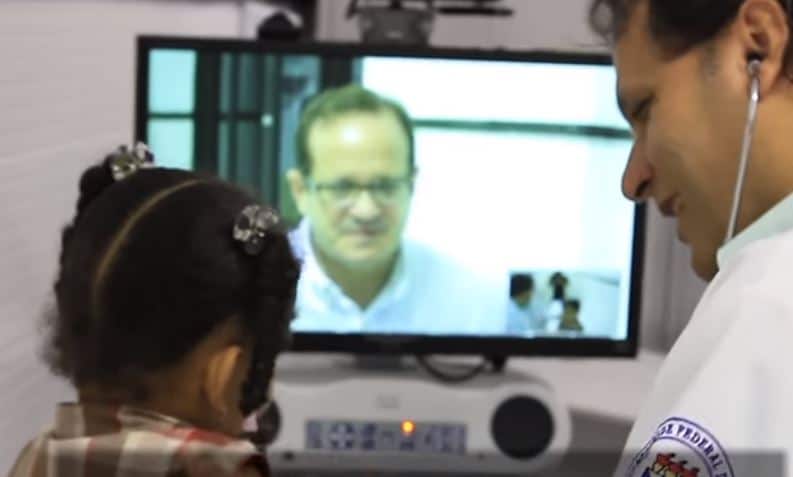Telehealth Services Demonstrate Potential for Patient Care Amid Pandemic Constraints

Telehealth services have made substantial progress throughout the COVID-19 pandemic despite the hardships the health care industry as a whole has had to endure.
The concept of telehealthcare is now more widely accepted than ever before. In August, a bipartisan group of lawmakers announced their support for granting additional funds for the Federal Communications Commission’s COVID-19 Telehealth Program in any upcoming coronavirus relief legislation, TWN previously reported.
By utilizing newly-established telecommunications infrastructures, physicians are able to provide care for patients remotely. Tom Conroy, co-founder, CEO and board chairman of MedSign, said this setup is ideal for elderly patients who might be particularly vulnerable in doctor’s waiting rooms across the nation.
MedSign is the parent company of Qortex, a subscription-based telehealth service that allows health care professionals to interact face-to-face with patients while eliminating many risk factors associated with doctors’ visits. The plug-in device enables two-way communication through a high-resolution camera that mounts onto patrons’ televisions.
“What you’re seeing as a result of COVID-19 — and it’s a shame to say this because telehealth should have taken off years ago — is the explosion of growth for telehealth,” Conroy said. “And that’s going to go from $10 billion in revenue by the end of this year — which is already a fivefold increase (from past years) — to over $200 billion by 2025.”
The service was specifically engineered to offer a senior-friendly, easy-to-use interface, he said. All communications employed through Qortex devices are protected to ensure HIPAA compliance and protect patients’ privacy.
Privacy is a key concern for many individuals who have yet to take the plunge into telemedicine services. According to a poll by the University of Michigan Institute for Healthcare Policy & Innovation, 27% of older adults who had yet to try a telehealth consultation had privacy concerns related to the service, a figure that dropped to 17% after individuals had experienced it at least once.
“(Hospitals) are still not reaching the demographic that (comprises) 75% of the Medicaid and Medicare dollars that are out there,” Conroy said. “And so it’s a tremendous opportunity not only for us, but for the country and for grandma and grandpa. They should be the ones that get telehealth in the home.”
While broadband internet connections still tend to be scarce in rural parts of the country, TV sets are more common. Around 80% of TV households in the U.S. have at least one Internet-connected TV device, according to Leichtman Research Group.
However, Qortex’s utility goes well beyond just video-streaming services, Conroy said. Adapting patrons’ TV set into an “intelligent portal” was a major component of Qortex’s design, creating a streamlined system of communication with medical professionals that is continuously available.
Qortex offers a diverse array of services to its subscribers. Nursing care, virtual checkups and therapeutic services can each be administered remotely by health care professionals through the device.
Another benefit offered by the service is the support it can provide for individuals challenged by mental health issues. In June, 40% of surveyed U.S. adults experienced “considerably elevated adverse mental health conditions associated with COVID-19,” according to the CDC.
Before the pandemic, there was no driving force for the implementation of telehealth services nationwide, Conroy said. The combination of technological advancement and the emergence of the highly infectious coronavirus set the stage for the sector’s rapid growth.
Despite congressional support for telemedicine, minds on both sides of the aisle required changing to get to this point, he said. Multiple presidential administrations had the opportunity to spur telehealthcare advancement when the issue was presented, but none did so because the incentives were not yet present.
In August, President Donald Trump signed an executive order that allowed some telehealth services to be coverable by Medicare, according to Healthcare Finance. The order allows Medicare to cover more than 135 telehealth services and makes copayments for the services waivable.
“Policymakers seem to be in a rush to pass legislation, but I think it is worth taking a little more time,” Juliette Cubanski, a Medicare expert with the nonpartisan Kaiser Family Foundation, told the Associated Press. “Fraud is one big area that policymakers need to be cognizant of.”
This sentiment was echoed by Conroy, who noted the U.S. Justice Department prosecuted dozens in Sept. 2019 who allegedly took part in a rampant telemedicine scheme that defrauded $2.1 billion from Medicare. The defendants in the lawsuit were reported to have deceived Medicare beneficiaries into “signing up for unnecessary genetic tests.”
The alleged conspirators profited by exploiting the fears of mostly elderly Americans in order to steal taxpayer dollars, a DOJ press release stated. The systems implemented by Qortex include caregiver monitoring safeguards that prevent fraud and ensure the requested health care is provided.
“We have to be prepared for the future,” Conroy said. “Telehealth is the future, but it’s also here now. But now, you’ve got to build on the safeguards. You’ve got to build a system that is trusted by the people it serves.”
























